
|
![]()
Greatest Films of the 1960s
1960 | 1961 | 1962 | 1963 | 1964 | 1965 | 1966 | 1967 | 1968 | 1969
Title Screen Film Genre(s), Title, Year, (Country), Length, Director, Description 


Alphaville (1965, Fr./It.) (aka Alphaville, Une Etrange Aventure De Lemmy Caution), 99 minutes, D: Jean-Luc Godard
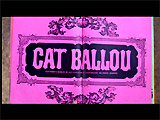


Cat Ballou (1965), 97 minutes, D: Elliott Silverstein
Director Elliot Silverstein's satirical, parody western comedy told about the title character hiring a notorious gunman to protect the ranch of her father from pressure by developers (the Wolf City Development Corporation - WCDC) to acquire his land and water rights. Throughout the film during musical interludes, two traveling minstrels (balladeers or troubadours) played banjos -- the Sunrise Kid (Nat King Cole) and Professor Sam the Shade (Stubby Kaye) - they intermittently performed songs and functioned as a 'Greek chorus' to comment upon the action. The opening sequence was during preparations for the gallows' hanging-execution of female outlaw Catherine "Cat" Ballou (Jane Fonda), who was jailed in her hometown of Wolf City, WY. The remainder of the film was a flashback leading up to her arrest for murder. Cat Ballou graduated from Sumpqua Normal School in 1894 as a prim and proper schoolteacher, and returned home by train to help protect her defenseless father Frankie and his young, mild-mannered, sole ranch hand - a Cherokee named Jackson Two-Bears (Tom Nardini). Their well water had already been poisoned (by the dumping of manure into it) to run them off. She briefly met the "muscle" employed by a rich railroad magnate to acquire her father's land - tough and threatening gunman Tim Strawn (Best Actor-winning Lee Marvin in a dual role), nicknamed Silvernose. He was dressed in black with a prosthetic nose. She decided to write a letter to reputed fast-draw gunfighter Kid Shelleen (also type-cast actor Lee Marvin spoofing his own macho image) asking to hire him for $50 dollars - sight unseen - to defend her father Frankie Ballou (John Marley) without knowing that he was a whiskey-soaked, staggering drunkard. Once he arrived, the legendary and notorious outlaw Kid Shelleen demonstrated that he was unable to shoot anything, although he was a crack shot if he was inebriated. Shortly later at the ranch, Frankie was gunned down outdoors by black-garbed Tim Strawn. Cat raced after Strawn into town to confront the hired killer, but she received little support from corrupt Sheriff Maledon (Bruce Cabot) to arrest Strawn and bring him to justice. Upon her return home, she discovered that her father's property had been moved out of the house, and the ranch was declared the "Property of Wolf City Development Corp. No Trespassing," owned by Sir Harry Percival (Reginald Denny). She threatened revenge and joined handsome accused cattle rustler Clay Boone (Michael Callan) and Boone's associate - drunken Uncle Jed (Dwayne Hickman) - and their outlaw gang in their hideout known as the Hole-in-the-Wall. In order to raise money, the vengeful Cat suggested that the gang rob a train rather than rustle 50 head of cattle, and after considerable pushback, the gang robbed the Colorado Southern's combination safe, holding the Wolf City Company's payroll of $50,000 dollars cash. Back at the hideout, Tim Strawn made a brief appearance and threatened Cat to return the stolen money to Sir Harry Percival: ("Sir Harry wants his money back! If you wasn't a girl, I'd split you like a chicken"); Kid Shelleen assured Cat that he would pursue Strawn for a stand-off. In preparation to confront Strawn, the Kid struggled to become sober and clean, and vowed to Jackson "no booze." In town, the Kid confronted Tim Strawn in an upstairs brothel room and shot him dead; then, he returned to the gang and entered the saloon, disguised as the black clad assassin with a silver nose to fool everyone. He revealed to the gang that he and Strawn were twin brothers. Meanwhile, Cat in a low-cut dress posed as a prostitute and visited Sir Percival in his private railroad car. She demanded, at gunpoint, that he sign a confession that he had hired Strawn to murder her father. When he resisted and they struggled for her Derringer, Sir Percival was shot dead. The film then returned to the present day with Cat in jail in Wolf City, awaiting her execution by hanging. With help from her disguised compatriots (Jackson, Uncle Jed, Clay Boone) and a suddenly-revived Kid Shelleen, Cat was rescued from the gallows and whisked away.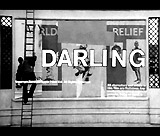


Darling (1965, UK), 128 minutes, D: John Schlesinger



Doctor Zhivago (1965, UK), 197 minutes, D: David Lean
Doctor Zhivago provided expansive, magical images of a frozen wintry Russian fairyland, a train ride through the Urals, and an ice-frozen house/castle (or dacha).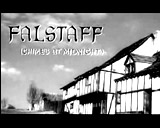


Falstaff (1965, Sp./Switz.) (aka Chimes at Midnight, or Campanadas a Medianoche), 113 minutes, D: Orson Welles
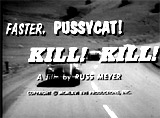


Faster, Pussycat! Kill! Kill! (1965), 83 minutes, D: Russ Meyer




Help! (1965, UK), 92 minutes, D: Richard Lester
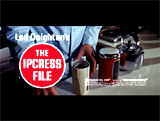



The Ipcress File (1965, UK), 109 minutes, D: Sidney J. Furie
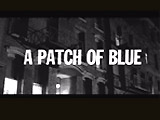

A Patch of Blue (1965), 105 minutes, D: Guy Green
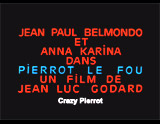


Pierrot Le Fou (1965, Fr.) (aka Crazy Pierrot, or Pierrot Goes Wild), 110 minutes, D: Jean-Luc Godard
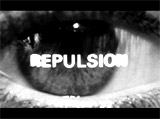



Repulsion (1965, UK), 104 minutes, D: Roman Polanski
This distubing, tense, frightening psychological horror thriller was one of Roman Polanski's best films - it was his second feature film (after Knife in the Water (1962)) and his first in English. A film's tagline declared: "The nightmare world of a virgin's dreams becomes the screen's shocking reality." The macabre tale was about the mental deterioration of beautiful, timid, sexually-repressed, claustrophobic and paranoid young blonde manicurist Carol Ledoux (21 year-old Catherine Deneuve) from Belgium. The film borrowed many elements from Alfred Hitchcock's Psycho (1960) and Michael Powell's Peeping Tom (1960, UK), such as sexual voyeurism and subtle auditory hints, and derived much of the suspense and dread from the use of everyday sounds (such as dripping water, the ticking of an alarm clock, a ringing telephone and doorbell, etc.). Often called one of the first English "New Wave" films, the film was controversial in both its graphic depictions of rape, but also featured the first orgasm 'heard' on the British screen. The film took place in a single location -- Carol's tiny London (Kensington) apartment -- which she shared with her older, sexually-liberated sister Hélène (Yvonne Furneaux), who was involved with a married boyfriend, a salesman named Michael (Ian Hendry). She became very uneasy about Helen's affair with Michael, including his intrusive toothbrush and razor left on the bathroom shelt, and their loud love-making nearby. While they were away on holiday in Italy for two weeks, Carol suffered a several mental breakdown with hallucinations and nightmares, one after the other. There were numerous shots of plates of rotting food with buzzing flies (an uncooked and skinned rabbit rapidly deteriorating), and three sprouting potatoes on the window sill. She imagined such harrowing images as a phantom night-time rapist, and giant cracks appearing from the walls with hands emerging from them to grope her (borrowed from Jean Cocteau's Beauty and the Beast (1946)). Ultimately, she was led to commit two brutal murders (her would-be boyfriend Colin (John Fraser) and her lusty landlord (Patrick Wymark)) when they intruded on her life. Upon the return of Helen and Michael, they discovered a catatonic Carol in the apartment - lifelessly lying under her bed on the floor amidst the carnage; surrounded by inquisitive neighbors. Michael carried Carol away for treatment (or arrest?).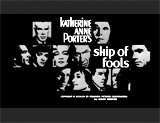

Ship of Fools (1965), 149 minutes, D: Stanley Kramer


The Shop on Main Street (1965, Czech.) (aka Obchod na Korze), 125 minutes, D: Ján Kadár and Elmar Klos
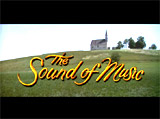


The Sound of Music (1965), 174 minutes, D: Robert Wise
This lovely 20th Century Fox Best Picture-winning film was based on the original 1959 Rodgers and Hammerstein stage musical play and on the 1949 memoirs regarding the true story of the famous singing Von Trapp family. They fled to escape the Nazis who were in the process of annexing Austria in 1938 during the Anschluss. It was a mixture of comedy, romance, and dramatic suspense - with a wonderful collection of musical tunes. Unlike the many hard-hitting B/W social dramas of the 60s (and the many troubling historical events including the threat of nuclear war, the start of the Vietnam War, JFK's assassination, and the Watts Riots), the successful and entertaining film (with five Academy Award wins) became the highest-grossing film of all time, dethroning Gone with the Wind (1939) for about five years. In its stylized dream world, restless novice postulant Maria (Julie Andrews) at the Nonnberg Abbey in Salzburg, Austria was first pictured daydreaming on the hillside surrounded by the beautiful Alps and singing the title song: "The Sound of Music" ("the hill are alive..."). Maria was persuaded by the Reverend Mother (Peggy Wood) to take a governess position for the motherless, singing family of stern, arrogant and retired militaristic widower Captain Von Trapp (Christopher Plummer) who was soon to be engaged to Austrian Baroness Schroeder (Eleanor Parker). At his expansive villa, she met the seven mischievous lined-up children, who had a well-deserved reputation for scaring off caretakers: 16 year-old Liesl (Charmain Carr), 14 year-old Friedrich (Nicholas Hammond), 13 year-old Louisa (Heather Menzies), 11 year-old Kurt (Duane Chase), 10 year-old Brigitta (Angela Cartwright), almost 7 year-old Marta (Debbie Turner), and 5 year-old Gretl (Kym Karath). Maria soon broke down the childrens' wariness of her by teaching them lessons and singing songs to them, such as the instructive "Do-Re-Mi" and "My Favorite Things." Although she refused to obey all of the Captain's orders, she also fell in love with her employer amidst the ominous Nazi occupation, and married him when he broke up with the Baroness. In the film's tense conclusion, the family was able to fool and convince the Nazis that they were journeying to the Salzburg music festival to perform. During their show and the singing of "So Long, Farewell," the family retreated backstage to take an escape route to the convent's Abbey before trekking over the Austrian Alps to find freedom in Switzerland (reprising "Climb Ev'ry Mountain").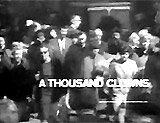


A Thousand Clowns (1965), 118 minutes, D: Fred Coe



Tokyo Olympiad (1965, Jp.) (aka Tôkyô Orinpikku), 170 minutes, D: Kon Ichikawa